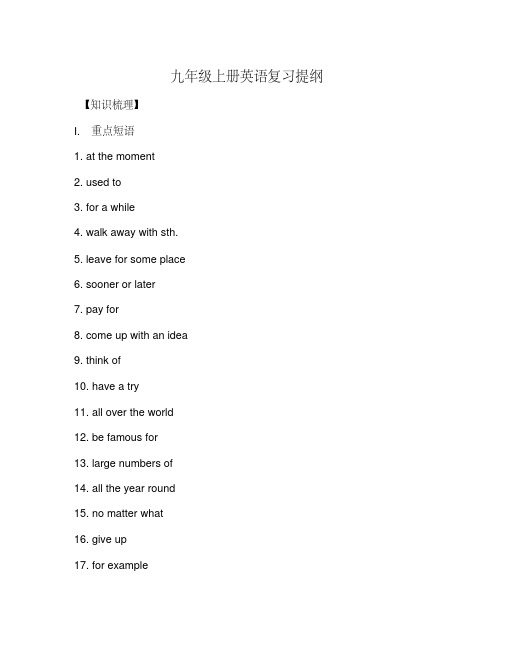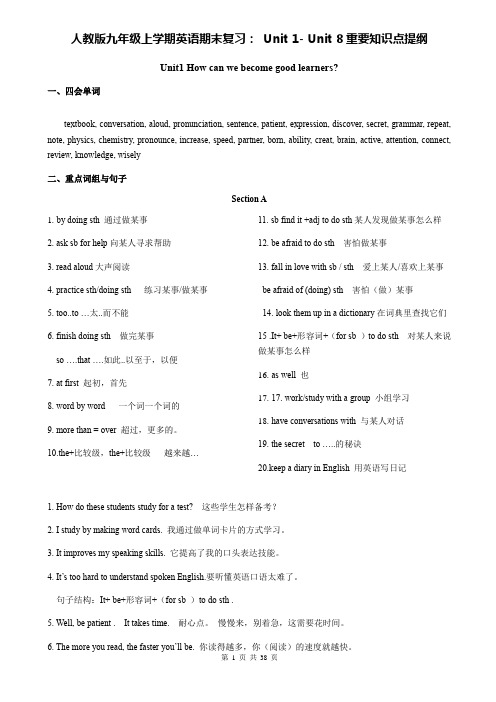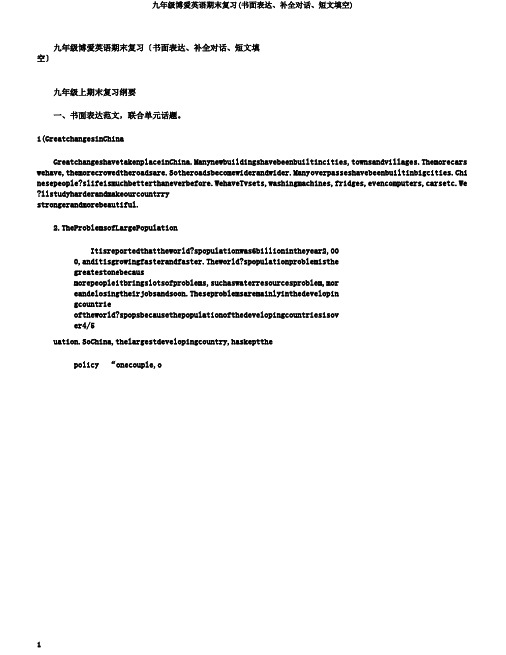九年级上册期末英语复习提纲
九年级第一学期英语期末复习提纲

九年级英语期末复习提纲Unit 6 When was it invented?★重点单词名词1.款式____________2. 高兴;愉快__________3. 网站___________4. pioneer_____________5. earthquake ___________6. customer_______7. 统治者______________8. 气味_____________9. 冰箱___________ 10. 锁;____________ 11. 疑惑_____________ 12. 英雄__________动词1. 列表_______________2. 提到_____________3. 闻到___________4. 贸易;交易__________5. 怀疑_____________6. 翻译___________7. 分开_______________8. 保持不变__________ 煮沸;烧开_________形容词1. 1. daily_____________2. national___________3. sudden __________4.音乐的______________5. 酸的_____________6. Canadian_________ 副词: 几乎;差不多____________代词:某人_______________★重点短语1. have a point _________________2. 意外地___________________3. take place____________________4. 毫无疑问_________________5. all of a sudden________________6. 错误地;无意中________________7. divide…into__________________8. 不但……而且________________9. be used for doing sth. ___________ 10. 钦佩;仰慕_________________ 11. dream of ___________________ 12. ……的数量__________________ 13. translate...into…_______________14. 掉进_____________________★重点句子1. ---电话是什么时候发明的?---我认为它是在1876年发明的。
九年级上册英语复习提纲

九年级上册英语复习提纲【知识梳理】I. 重点短语1. at the moment2. used to3. for a while4. walk away with sth.5. leave for some place6. sooner or later7. pay for8. come up with an idea9. think of10. have a try11. all over the world12. be famous for13. large numbers of14. all the year round15. no matter what16. give up17. for example19. on business20. so far21. come true22. set off23. slow down24. go on doing25. wait for26. be proud of27. be afraid of28. speak highly of29. a year and a half30. half a year31. pick up32. as soon as33. keep… clean34. take care of35. cut down36. make a contribution to37. base on38. make sure40. begin with41. right now42. as soon as possible43. leave a message44. all kinds of things45. walk around46. fall asleep47. wake up48. go on a trip49. have a good time50. take photos51. come out52. come on53. have a family meeting54. talk about55. go for a holiday56 go scuba diving57. write down58. by oneself59. walk along60. get a chance to do sth61. have a wonderful time62. book a room63. have an accident64. be interested in65. use sth. to do sth.66. make a TV show67. be amazed at68. take part in69. feed on70. get out ofII. 重要句型1. Why don’t you do sth.?2. make sb. Happy3. borrow sth. from sb.4. forget to do sth.5. pay fro sth.6. return sth. To sb.7. learn sth. from sb.8. be famous for sth.9. No matter what… 10. be with sb.11. go on doing sth.12. speak highly of sb.13. keep doing sth.14. allow sb. To do sth.15. encourage sb. to do sth. 16. It is said that… III. 交际用语1. --- Excuse me, have you got …?--- Yes, I have. (Sorry, I haven’t.)2. --- Why don’t you …?--- Thanks, I will.3. --- Thanks a lot. (Thank you very much.)--- You are welcome.4. --- Have you ever done…?--- Yes, I have, once. (No, never.)5. --- I’ve just done…--- Really?6. ---What’s …like ?7. --- How long have you been…?--- Since…8. --- Have you ever been to…?--- I’ve never been there. (None of us has./ Only …has. ) 9. --- Would you like to have a try?--- I don’t think I can…10. --- What have you done since…?11. --- How long have you been at this …?--- For…12. --- How long has she/ he worked there…?--- S he’s / He’s worked there for… / all her / his life.13. --- I’m sorry he isn’t here right now.14. --- May I help you?15. --- That’s very kind of you.16. ---Could we go scuba diving?17. --- Could you tell us how long we’re going to be away?18. --- Let’s try to find some information about it, OK?19. --- Could you please tell me how to search the Internet?20. --- Go straight along here.21. ---Please go to Gate 12.22. --- Please come this way.23. --- Could you tell me what you think about Hainan Island?24. --- That sounds really cool!IV. 重要语法1. 宾语从句2. 现在完成时3. 一般过去时与现在完成时的用法比较:【名师讲解】1. Maybe/ may be(1) maybe是副词,意思是“大概,也许”,常用作状语。
九年级上册英语期末复习提纲

九年级上册英语期末复习提纲I. GrammarA. Parts of Speech1. Nouns, pronouns, verbs, adjectives, adverbs, prepositions, conjunctions, interjections2. Determiners: articles, demonstratives, possessives, quantifiersB. Verb Tenses1. Present simple, present continuous, present perfect simple, present perfect continuous2. Past simple, past continuous, past perfect simple, past perfect continuous3. Future simple, future continuous, future perfect simple, future perfect continuousC. Sentence Structures1. Subject-verb agreement2. Simple, compound, and complex sentences3. Active and passive voice4. Reported speech: statements, questions, imperativesII. VocabularyA. Synonyms and Antonyms1. Identify words with similar and opposite meanings2. Use context clues to determine word meaningsB. Word Formation1. Prefixes and suffixes2. Word families: nouns, verbs, adjectives, adverbsC. Idioms and Phrasal Verbs1. Understand and use commonly used idiomatic expressions2. Comprehend and use phrasal verbs in contextIII. Reading ComprehensionA. Fictional Texts1. Identify main ideas and supporting details2. Analyze character development, plot, and conflict in a story3. Make inferences and predictions based on text evidence4. Understand literary devices: similes, metaphors, personification, ironyB. Non-Fictional Texts1. Identify main ideas and supporting details2. Understand text structure: cause and effect, compare and contrast, problem and solution3. Analyze author's purpose, tone, and point of view4. Use context clues to determine the meaning of unfamiliar wordsIV. WritingA. Narrative Writing1. Write a cohesive story with a clear beginning, middle, and end2. Develop characters, setting, dialogue, and plot3. Use appropriate narrative techniques: foreshadowing, flashbacks, suspenseB. Descriptive Writing1. Use vivid language and sensory details to describe people, places, and objects2. Organize ideas logically and coherentlyC. Expository Writing1. Write informative essays, reports, and explanations2. Use evidence and examples to support claims3. Provide clear introductions, body paragraphs, and conclusionsD. Argumentative Writing1. State a clear thesis and present a well-reasoned argument2. Support arguments with evidence and counterarguments3. Acknowledge and address opposing viewpointsV. ListeningA. Understanding Spoken Texts1. Listen for main ideas and specific details in conversations, speeches, and presentations2. Understand different accents and speech patternsB. Responding to Spoken Texts1. Answer questions based on spoken texts2. Participate in discussions and conversationsVI. SpeakingA. Oral Presentations1. Give an organized and coherent presentation on a given topic2. Use appropriate speaking techniques: eye contact, body language, voice projectionB. Expressing and Defending Opinions1. Express personal opinions and support them with reasons and evidence2. Engage in debates and discussions with classmatesVII. Vocabulary and Grammar ReviewA. Practice exercises and quizzes to reinforce vocabulary and grammar conceptsB. Review worksheets and assignments from throughout the semesterC. Seek additional help or clarification on any difficult concepts。
九年级上册英语复习提纲

九年级上册英语复习提纲Unit 1重点词组:1.通过制作单词抽认卡来记忆:制作单词抽认卡2.向某人求助:请求帮助3.大声朗读:朗读4.通过那种方式:以那种方式5.提高我的口语技能:改善我的口语能力6.例如:比如说7.玩得开心:享受乐趣8.与朋友交谈:与朋友交流9.感到兴奋:感到激动10.最终以说汉语结束对话:最终以中文结束对话11.做关于。
的调查:进行。
的调查12.记英语笔记:写英语笔记13.英语口语:口语英语14.犯错误:犯错误15.发音正确:发音准确16.练说英语:练口语17.首先:首先18.以。
开始:从。
开始19.随后:之后20.在课堂上:在课堂上21.嘲笑:嘲笑22.记笔记:做笔记23.喜欢做某事:享受做某事24.写下:记录25.查找:查找26.说本族语的人:母语者27.编造:编造28.全世界:全球29.对待:处理30.担心:担心31.生某人的气:生气32.保持生气:维持愤怒33.消逝:流逝34.把。
当做。
把。
视为。
35.抱怨:抱怨36.把。
变成。
把。
转化为。
37.在。
的帮助下:在。
的协助下38.把。
与。
作比较:将。
与。
进行比较How do you prepare for a test。
This is a n that many students ask themselves。
Some people study by reading textbooks and taking notes。
while others prefer to listen to recordings or watch videos。
Wei Ming。
however。
XXX at all。
He has physical problems with his hearing。
which makes it difficult for him to understand the voice。
Despite this。
he has learned a lot by memorizing the words of pop songs.Wei Ming's experience is different from that of his friend。
九年级上册英语复习提纲

—— and .
A. So has she; so have you B So has she; so you have C So she has; so have you
3. by asking the teacher for help 通过向老师寻求帮助
4. What about reading aloud to practice pronunciation?大声阅读来练习发音怎么样?
5. specific suggestions 具体建议
6. memorize 动词: 记住;熟记
We don’t allow smoking in class. 我们不允许在教室里抽烟。
Students shouldn’t be allowed to smoke in class. 学生不应该被允许在教室里抽烟。
2. get their ears pierced 打耳洞 get sth done; 类似结构 have sth done; 意思是使某事某物被……
I used to get up late, but now I am used to getting up early. 我过去常晚起,但是我现在习惯早起。
2. I’m on the swim team. 我在游泳队里。
3. be interested in sth=take an interest in sth
12. spoken English 英语口语
13. make mistakes in grammar 在语法方面犯错误
14. I don’t know how to use commas. 我不知道怎么用逗号 特殊疑问词+to do
人教版九年级上学期英语期末复习: Unit 1- Unit 8 重要知识点提纲(全面!)

人教版九年级上学期英语期末复习:Unit 1- Unit 8重要知识点提纲Unit1 How can we become good learners?一、四会单词textbook, conversation, aloud, pronunciation, sentence, patient, expression, discover, secret, grammar, repeat, note, physics, chemistry, pronounce, increase, speed, partner, born, ability, creat, brain, active, attention, connect, review, knowledge, wisely二、重点词组与句子Section A1.by doing sth 通过做某事2. ask sb for help向某人寻求帮助3. read aloud大声阅读4. practice sth/doing sth 练习某事/做某事5. too..to …太..而不能6. finish doing sth 做完某事so ….that ….如此..以至于,以便7. at first 起初,首先8. word by word 一个词一个词的9. more than = over 超过,更多的。
10.the+比较级,the+比较级越来越… 11. sb find it +adj to do sth某人发现做某事怎么样12. be afraid to do sth 害怕做某事13. fall in love with sb / sth 爱上某人/喜欢上某事be afraid of (doing) sth 害怕(做)某事14. look them up in a dictionary在词典里查找它们15 .It+ be+形容词+(for sb )to do sth 对某人来说做某事怎么样16.as well 也17.17. work/study with a group 小组学习18.have conversations with 与某人对话19. the secret to …..的秘诀20.keep a diary in English 用英语写日记1. How do these students study for a test? 这些学生怎样备考?2. I study by making word cards. 我通过做单词卡片的方式学习。
九年级仁爱英语期末复习(书面表达、补全对话、短文填空)

九年级博爱英语期末复习〔书面表达、补全对话、短文填空〕九年级上期末复习纲要一、书面表达范文,联合单元话题。
1(GreatchangesinChinaGreatchangeshavetakenplaceinChina.Manynewbuildingshavebeenbuiltincities,townsandvillages.Themorecars wehave,themorecrowedtheroadsare.Sotheroadsbecomewiderandwider.Manyoverpasseshavebeenbuiltinbigcities.Chi nesepeople?slifeismuchbetterthaneverbefore.WehaveTvsets,washingmachines,fridges,evencomputers,carsetc.We ?llstudyharderandmakeourcountrrystrongerandmorebeautiful.2.TheProblemsofLargePopulationItisreportedthattheworld?spopulationwas6billionintheyear2,000,anditisgrowingfasterandfaster.Theworld?spopulationproblemisthegreatestonebecausmorepeopleitbringslotsofproblems,suchaswaterresourcesproblem,moreandelosingtheirjobsandsoon.Theseproblemsaremainlyinthedevelopingcountrieoftheworld?spopsbecausethepopulationofthedevelopingcountriesisover4/5uation.SoChina,thelargestdevelopingcountry,haskeptthepolicy “onecouple,onechild. 〞3.SavingtheEarthAstimegoesby,manismakingtheearthsick.Peoplecutdowntoomanytreesandleaverubbisheverywhere.Factoriesletouttheirwastewithoutdoinganyingtoit.Thishascausesomeseriousproblems.S uchasthelandissandy,theriverisdirty,theairislessclean,eventhetemperatureoftheearthisrising.Whatshouldwed otosavetheearth?Mysuggestionisthatweshouldplantmoretrees,putrubbishintodusbinsandstopfactoriespouringwas tedirectlyintotheairorrivers.Inall,wehaveonlyoneearth,weshoulddoourbesttoprotectit,orwewillregret.toProt ecttheEnvironment?Goodenvironmentcanmakepeoplefeelhappyandfit.Toimprovetheenvironmentmeanstoimproveourlife.Weshouldplantmo retreesandflowersaroundus.Weshouldn?tcutthemdown.Weshouldstopfactoriesfrompouringwastewaterintotherivera ndwastegasintotheair.Wheneverweseelitterontheground,weshouldpickitupandthrowitintodusbins.Neverspitinpub lic.Don?tdrawonpublicwalls.It?sourdutytoprotecttheenvironment.toProtecttheWaterResource?Waterisveryimportanttous.Wecan?tlivewithoutwater.Butsomepeopledon?tcareaboutthis.Theyoftenwastealotofwater.Theypourdirtywaterintoriversandlakes,andpollutethrowlitterintothem,too.Manyriversandlakesareseriouslypolluted.Weshouldtryourbesttodosomethingtostopthepollution.Wemustprotectthewater.Suchassavewaterasposssi bleaswecan.Turnoffthewatertapsintimewhenwedon?tusethem.Wemustfindwaystoreuseit.Ifwedon?tprotectit,thelastdropofwaterwillbeourtear.学习英语的重要性Englishisthemostpopularlanguageintheworld,anditisalsomostwidelyspokenofallthelanguage.Itismothertonguein manyimportantcountries,suchastheUSA,England,Australiaandsoon.InIndia,Thoughitisnotthemothertongue,it,stheimportantofficallanguage.InChina,Englishisspokenasanimportantandusefulforeignlanguage.The2021OlympicswillbehostedinBeijing.Manyfo reignerswillcometoChina.WeshouldtryourbesttoservetheOlympics.Forexample,wecanhelptheforeignvisitorsifwel earnEnglishwell.OurCityItisveryimportanttodealwiththerubbishtherubbishincities.Rubbishmustbethrownawayorreusedproperly.Oritmaycausealotofproblems.Itmaypollutetheairandwater.Peoplemaygetillwhentheybreathethepollutedairordrinkthepollutedwater.Ourcityhasstartedtofacetheproblem.Somerubbishissortedandsenttoacertainplaceandburied.Wastegasiscleanedbe foreitgoesintotheair.Wastewaterisalsocleanedbeforeitispouredintorivers. Peopleshouldbepreventedfromthrowingrubbisheverywhere.Weshouldtryourbesttotakecareofourenvironmentandfigh tagainstpollution.二、补全对话。
九年级英语上学期复习资料整理

九年级英语上学期复习资料整理
一、词汇复
- 复并掌握九年级上册的主要单词和短语,特别是重要的动词和形容词。
二、语法复
- 复并掌握九年级上学期的主要语法知识,包括句子结构、时态、语态、名词性从句、定语从句等。
三、阅读理解
- 阅读并理解九年级上学期的课文和相关阅读材料,注意把握文章的主旨、细节和逻辑关系,提高阅读理解能力。
四、写作技巧
- 复并掌握九年级上学期的写作技巧,包括句子结构、连词的使用、段落组织等。
五、口语表达
- 练口头表达能力,进行口语对话练,扩展词汇量,并锻炼流利、准确的口语表达能力。
六、听力训练
- 进行听力练,提高听力理解能力,注意抓住关键信息和上下文的逻辑关系。
七、自主研究
- 多阅读英语原版书籍、报纸、杂志等,培养独立研究的惯,提高英语综合能力。
八、练题
- 注重做一些与九年级上学期知识相关的练题,巩固复所学的知识。
以上是九年级英语上学期复的一些资料整理建议,希望能对你的研究有所帮助。
- 1、下载文档前请自行甄别文档内容的完整性,平台不提供额外的编辑、内容补充、找答案等附加服务。
- 2、"仅部分预览"的文档,不可在线预览部分如存在完整性等问题,可反馈申请退款(可完整预览的文档不适用该条件!)。
- 3、如文档侵犯您的权益,请联系客服反馈,我们会尽快为您处理(人工客服工作时间:9:00-18:30)。
九年级上册期末英语复习提纲Unit4whatwouldyoudo1.whatif如果```将会怎么样2.not…intheslightest一点也不,根本不3.plentyof+(不)可数n/enough+n.很多的,足够的4.getalongwith 与`````相处5.letsbdown使```失望或沮丧eupwith=thinkof=thinkup想出eout出饭,发表8.medicalresearch医学研究9.wearatie/necktie戴领带10.worryabout=beworriedabout担心11.getpimples得了小脓疱12.takeanexam/test(later)稍后考试13.passtheexam通过考试14.failtheexam考试不合格15.feel/beconfident感到自信haveconfidenceinsth/dongsth走某事有自信16.withoutpermission未经允许withone’spermission经过某人许可askforone’spermission请求某人的允许17.bothersb打扰某人18.not….intheslightest=not….atall根本不19.get/beannoyedatsb对某人生气20.representourclass代表我们班级eupwith想出22.getthemedicalhelp取得医护帮助23.makesb+adj(comfortable)使某人舒服24.staywithsb与某人呆在一起25.theburnedarea受伤的部位26.(cold)runningwater(冰)自来水27.stopdoingsth停止做某事Stoptodosth停下来做某事28.havealotofexperience有许多经验29.beconfidentofsth对某物自信lionsof成百万上千万31.hundredsof成百上千32.talktosbaboutsth与某人谈论某事33.hidesthfromsb向某人隐藏...;把...瞒着某人34.inapublicplace=inpublic在公共场所35.make/giveaspeech发表演讲36.inthefrontof(内部)在````前面infrontof(外部)在```前面37.talkalot健谈38.getnervous紧张的39.introducesbtosb把某人介绍给某人introduceoneselftosb向...作自我介绍40.doasurveyabout做一个.....的调查41.hardlyever 几乎不42.borrowsthfromsb从某人那借某物lendsthtosb把。
借给某人43.beinamovie演电影44.socialsituations社会情况45.catchupwithsb赶上,追上46.therestofsth剩余的东西47.havearest/break休息48.haveafirst-aidbook有一本急救书49.onanearbyshelf在靠近书架的位子50.coversthwithsth用某物盖住某物51.becoveredwithsth被`````覆盖52.presssthhard用力挤压53.goupstairs上楼54.godownstairs下楼55.falldownstairs从楼上摔下56.burnoneselfbyaccident意外烧伤57.injureone'sknee某人的膝盖受伤getinjured受伤58.offersbsth=offersthtosb.提供某人某物offertodosth主动提出做某事59.refusetodosth拒绝做某事60.givemoneytocharity给慈善机构捐钱61.putmoneyinthebank把钱放入银行62.buyabighouseformyfamily为我家买一个大房子63.travelaroundtheworld周游世界64.giveadviceonsth给一些关于某方面的建议65.asksbforadvice 向某人寻求建议66.hurrytodosth快速做某事67.acompanyof…一群…68.beeasytogetalongwith容易交往/相处69.ratherthan而不是70.wouldratherdoAthandoB宁愿做A也不愿做B71thinkof思考;认为;想起72.saysomethingbad说坏话73.havelotsofexperience(in)doingsth在做某方面事情上有丰富经验1.Whatwouldyoudoifyouhadamilliondollars如果你有一百万美元,你会怎么做呢?2.IfIwereyou,I’dtalktosomeonewholooksfriendly.如果我是你,我将和看起来友好的人讲话。
4.whatdoyouthinkIshouldtelltherestofthestudents你认为我应当告诉其余的同学们什么?5.Youliketalkingtooneortwopeopleratherthantoagroup.你喜欢和一个或两个人交谈,而不是一群人。
6.Youmustalwayshidemedicinefromchildren.你必须把药藏到小孩子们看不到的地方。
这本书针对很多不同情况下该怎么做提出了建议。
虚拟语气虚拟语气用来表示说话人的主观愿望或假想,而不表示客观存在的事实,所说的是一个条件,不一定是事实,或与事实相反。
虚拟语气通过谓语动词的特殊形式来表示。
一、条件状语从句分类条件句可分为两类,一类为真实条件句,一类为非真实条件句。
非真实条件句表示的是假设或实际可能性不大的情况,故采用虚拟语气。
eg:Ifhedoesn'thurryup,hewillmissthebus.如果他不快点,他将错过巴士。
(真实)Ifheisfree,hewillaskmetotellstories.如果他是空闲的,他会要求我讲故事。
(真实)IfIwereyou,Iwouldgoatonce.如果我是你,我马上就会去。
(我不可能是你。
非真实,虚拟语气)Iftherewerenoair,peoplewoulddie.如果没有空气,人就会死亡。
(不可能没有空气。
非真实,虚拟语气)二、用法及动词形式1、表示与现在事实相反的情况:从句:If主语+过去时(be动词用were),主句:主语+should/would/could/might+doeg:IfIwereyou,Iwouldtakeanumbrella.(事实:我不可能是你)IfIknewhistelephonenumber,Iwouldtellyou.(事实:不知道)Iftherewerenoairorwater,therewouldbenolivingthingsontheeart h.(事实:地球上既有空气也有水)IfIhadanymoneywithme,Icouldlendyousome.(事实:没带钱)2、表示与过去事实相反的情况:从句:If主语+had+done主句:主语+should/would/could/might+havedoneeg:IfIhadgotthereearlier,Ishould/couldhavemether.如果我早到那儿,我就会见到她。
(事实:去晚了)3、表示对将来情况的主观推测从句:①if+主语+weretodo主句:①主语+should/would/could/might+do②if+主语+did/were②主语+should/would/could/might+do③if+主语+should+do③主语+should/would/could/might+doeg:Ifheshouldcomeheretomorrow,Iwouldtalktohim.如果他明天来这儿的话,我就跟他谈谈。
(事实:来的可能性很小)Unit5ItmustbelongtoCarla.1.belongtosb(代词用宾格)=besb’s属于2.hairband发带eup 用完=runoutof4.haveapicnic=goonapicnic=atapicnic野餐5.inasymphonyhall在交响乐大厅6.becrucialtosb对某人来说至关重要7.It’scrucialtodo/that从句8.makeup组成makeup30%ofthefinalexam在期末考占30%9.be/get/feelanxiousaboutsb/sth对…忧虑10.be/get/feelworriedabout=worryabout11.theownerof…的主人12.chasesb=runaftersb追赶某人13.intheshy在天空中14.catchthebus赶上公共汽车15.catchupwithsb赶上某人16.makenoise(不可数)制造噪音发出奇怪的声音17.benoisy(adj)吵闹的18.intheneighborhood在…小区19.escape(from+地点)从…逃跑20.pretendtodosh假装做某事21.pretendtobedoingsth假装正在做某事22.attempttodosth意图做某事23.becauseof+n/doingsth因为…because+从句24.nextdoorneighbor邻居edto过去常常26.beextremelyworried非常担心27.beinterviewedby被......采访28.localnewspaper当地报纸29.callthepolice报警30.atfirst首先31.haveone`sownidea有某人自己的主意32.getoff下车geton上车33.belessofaproblemtodosth做某事不成问题。
